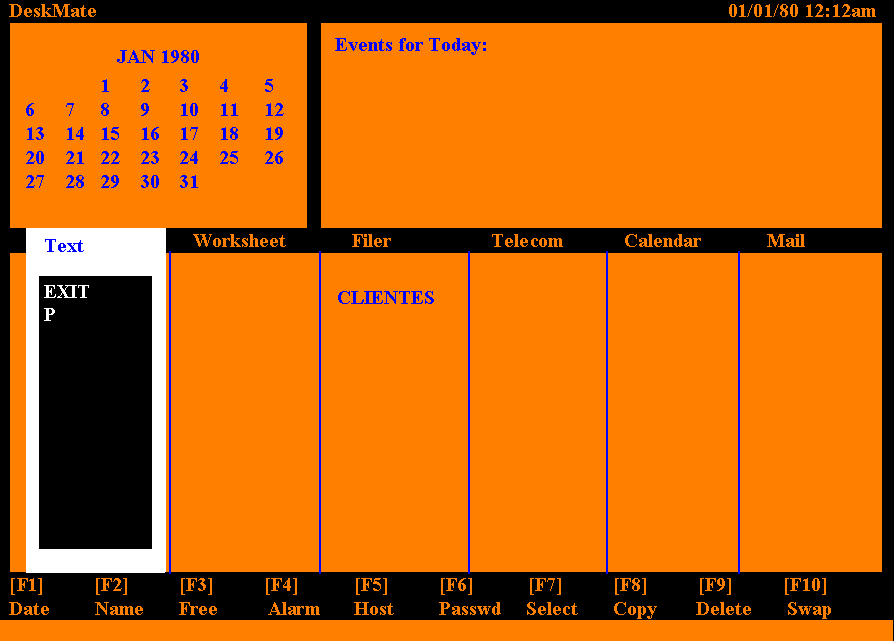
WINDOWS AND DESKMATE!
(Original press release from Tandy Radio Shack)
With the increased popularity of 386SX-, 386-, 486SX-, and 486-based computers, the demand for Microsoft Windows 3.0 is increasing dramatically. Let's take a look at how DeskMate and Windows 3.0 compare: the similarities and the differences.
We'll also take a more in-depth look at the benefits of Windows 3.0.
---
As graphical user interfaces, DeskMate and Windows have a lot in common. Both of these products make PCs easier to use by providing a point (at what you want to do) and click (to do it) environment. And they both include several application programs and accessories. Similar applications included in both are: word processing (TEXT and Write), data base (FILER and Cardfile), draw/paint programs (DRAW and Paintbrush), and telecommunications. Some of the accessories common to both are: a calculator, a clipboard, and a notepad (Corkboard in DeskMate).
---
What is the difference? Windows has advanced graphics and several advanced features (like multi-tasking and memory management) that need a lot of computing power for best results.
DeskMate is optimized to work with a 286 (or smaller) processor.
---
To allow Windows to run an 8088/8086/80286 based computer, Microsoft has included 3 different "modes" of operation:
Real (for 8088/8086), Standard (for 80286 or less), and Enhanced (for 386 or better). While it is possible to use Windows in the Real Mode or the Standard Mode on some 8088/8086/80286 computers, critical features like multi-tasking are lost or operate at an unacceptable speed on these smaller computers. Even a 386 computer must have 2 MB of RAM to take advantage of the advanced features and use the Enhanced Mode.
---
Competitors will sometimes bundle Windows with a 386SX computer that has 1 MB of memory. In this configuration, competitor's computers cannot use many of the advanced features available in the Enhanced Mode.
---
Major Windows 3.0 Benefits:
Welcome to the world of Windows! More than 6 million copies of Windows 3.0 have been shipped since its introduction. Microsoft predicts that more than 50% of the DOS installed base (more than 20 million systems) will convert to Windows 3.0. You can see that it clearly has industry acceptance.
Let's take a more in-depth look at some other major benefits of Windows 3.0: memory management (up to 32 MB of RAM), multi-tasking, and application availability.
DOS alone is limited to 640K bytes, and even with LIM/EMS (DOS memory managers), DOS systems are limited to running one application at a time. With Windows 3.0 running in the Enhanced Mode, it is possible to use the hard drive as additional RAM (up to 16 MB). That's because Windows 3.0 takes more complete advantage of the protected and virtual modes of the 80386 (and 80386SX).
To many, that means more power, and the need for machines without a huge amount of memory.
Windows advanced memory management capability allows the program to "break the 640K barrier." 286- and 386-based units now have access to available RAM, up to 16 MB (and 32 MB for 80386 systems). Power users can now work with all of their applications and files at the same time. A standard MS-DOS application such as Lotus 1-2-3 can run in a window on 386 hardware alongside a graphical application like PageMaker. This allows users to copy information from Lotus and paste them directly into PageMaker. Windows, like DeskMate, can run standard DOS applications, but there are currently more than 900 Windows applications available, and the number is expected to reach more than 1,500 by early 1992.
And like DeskMate, all Windows programs work the same way!
Windows application programs include best-selling spreadsheets like EXCEL and Lotus 1-2-3 for Windows, and desktop publishing programs like Aldus PageMaker.
See your local Radio Shack Dealer to get a list of available Windows software.
---
Conclusion
DeskMate and Windows are both Graphical User Interfaces. Both have a lot in common, from the point-and-click interface to the included applications and accessories. DeskMate is optimized for use on a PC with any processor and 512K.
Windows is optimized for a 386SX or an even more powerful machine with more than 1 MB of memory.
pcbiography.net